
views
- Stay updated on the latest politics in your community and nationally by reading the newspaper, paying attention to community forums, and using social media.
- Connect with your community and get involved by volunteering for local committees and sitting on local boards for causes you’re passionate about.
- Use local events as an opportunity to practice your public speaking skills, such as participating in debates.
Getting the Necessary Education

Get an undergraduate degree in political science. Though you can get into politics without having even finished high school, you may be more appealing to voters if you have a relevant degree. An undergraduate degree in political science will allow you to have a strong foundation in the basics of government and politics, as well as the history of politics in your country. Most colleges and universities offer a B.A. in political science. A political science degree will allow you to understand how to process and analyze political data and strengthen your communication skills. You will also take courses in conflict resolution and public speaking.
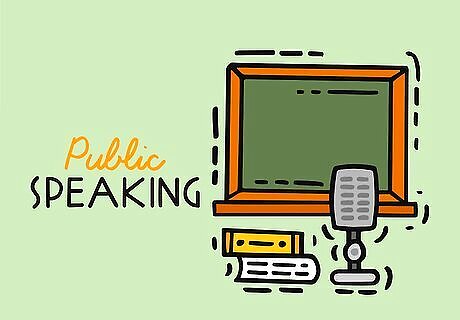
Take public speaking classes. If you decide not to pursue a B.A. in political science, you should still consider taking public speaking classes. You can take these classes at your local college or university, or through a public speaking association. Public speaking classes can help prepare you for a key element of a successful politician: the ability to speak persuasively and effectively in front of a crowd. This is a good option if you do not have the funds to pay for a B.A. in political science or if you are looking for a way to improve your political skills during your free time. Taking even a few public speaking classes could help you gain more self-confidence and self-assurance, both key characteristics of a good politician.

Participate in speech and debate. If your high school offers speech and debate classes, you should sign up and push yourself to compete against your peers in debates. Strong debate skills will come in handy for when you are having to debate with other candidates on local issues during your campaign. You may want to compete in forensics competitions through the National Speech and Debate Association to push yourself even further and get better at performing in front of an audience.

Stay updated on the latest politics in your community and nationally. A good politician will be well educated on local events, especially if she is running for local office. Stay on top of the latest political events in your community, from the smallest to the largest issues. You should also be aware of what is going on on a national level so you are well informed and get in the habit of remembering the latest news events. One way to do this is to use social media to your advantage and follow known politicians and individuals involved in politics on platforms like Twitter and Facebook. You can then read what they are talking about and get information through their news feeds. You should also get in the habit of checking several political news sites and blogs every day. Try to look at several news sources that present differing opinions on a topic. For example, you may check a conservative news outlet for information on an abortion case and then a liberal news outlet for information on the same case. This will give you a well rounded sense of both sides of the issue and also help you determine where you stand on an issue.
Creating a Strong Public Persona
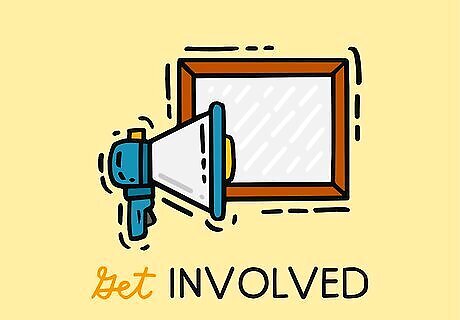
Get involved in local community initiatives and causes. Before you can run for president of the United States, you will need to start small and work your way up from local politics to national politics. To be effective at a local level, you will need to connect with your community and get involved. You should volunteer for local committees and try to sit on local boards for causes that you are passionate about. Join the local chapter of your preferred political party and get involved in initiatives for the political party in your community. Creating a strong presence in your community will alert community members of who you are and what you stand for. Devoting your time to local causes and initiatives will also show your community that you are willing to volunteer your energy out of a need to do some good, not just to get paid. This will come in useful later when you decide to run for office.

Connect with community leaders. You should also reach out to the leaders in your community and connect with them. This will help to set the groundwork for your campaign later, as you will have these political relationships to lean on when you need them. Forming strong bonds with these leaders will also allow you to learn and watch how these leaders conduct themselves in the community. You should take mental notes and pay attention to how these leaders gain respect and acknowledgement in the community. You can then use these skills later in your campaign.
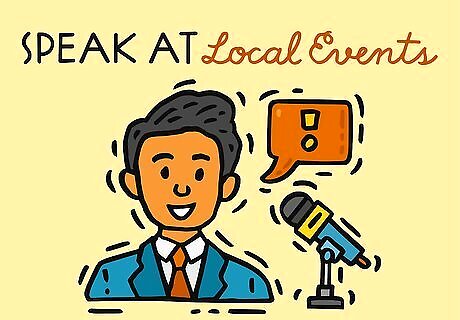
Speak at local events and participate in local debates. You should use local events as an opportunity to practice your public speaking skills, even if they are not political gatherings. Try to be in the public eye as much as possible, especially for causes that you are passionate about. You should also participate in local debates as a representative for your community, as this will allow you to showcase your passion for change and your public speaking abilities. In addition to speaking to large audiences, you should also get into the habit of speaking to individuals in the community one on one. This could be through conversations with locals at coffee shops and local hang outs as well as time spent in the crowds talking to individuals who are participating in local events. Doing this will get you used to connecting with people on a smaller scale and making a personal connection with your potential voters. When giving a speech, do your best to stay connected to why you are speaking. Remember to not make it about you—if you're in front of a group and are looked at as a leader, your speech is about them, not you. Show them that you care. If you do not have experience talking to the public, you must identify the root causes of your fear and release them. If you're unable to do that, it won't be possible to get better at it. Make sure that your body posture is strong and that you're standing firmly on your feet. Do some deep breathing, practice pausing and practice really looking people in the eyes.

Use social media to promote your ideas. In this day and age, having a strong social media presence is essential to maintaining a public persona. You should set up social media accounts for yourself that showcase your public self and use it on a consistent basis to connect to others. Your social media profiles should have professional photographs and you should maintain a persona that is appropriate for someone who may become an elected official one day. You can use your social media accounts to follow known political figures in your community and nationally. You can also use your social media later to build momentum for your political campaign.
Running For Office
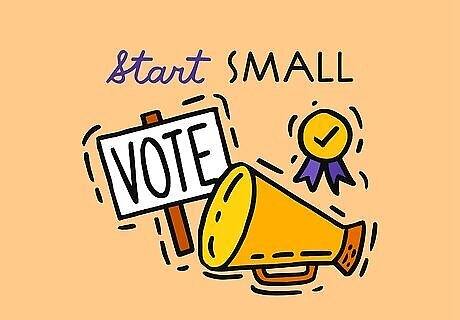
Start small and then work your way up. Most successful politicians started at the local level and then worked their way up for the years to national positions at the federal level. If you are just entering politics, you should focus on building momentum as a local politician and then use this as a foundation to aim for higher positions. You may start by campaigning for a school or community board position, a position as mayor or a town council member, or a seat in the lower house of the state government. At the local level, staffs, budget, and campaign funds are usually small and limited. You may not have a lot of funding or a big staff, but you may not need it to be successful at the local level. Getting a position at the local level can also allow you to build relationships within your preferred political party, which could help your career later if you decide to go for a higher position in the party.
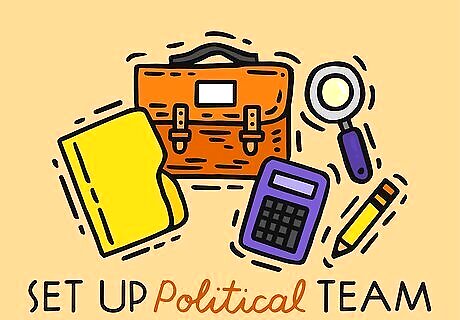
Set up a political team. Even at the local level, you will need to set up a political team that will support you during your campaign. You may have a small team of individuals that you can rely on and then a small team of volunteers who can act as boots on the ground. Your team may consist of a campaign manager, a marketing manager, and a volunteer manager, or you may have one to two people splitting these roles. You may ask family and friends to fulfill these roles for your campaign, as you may not want to pay for outside help and you want individuals you can trust. You should also enlist family and friends to act as volunteers for your campaign. You can do this by sending out a mass email requesting help with your campaign, by going in person to enlist help, or by setting up a volunteer sign up page on your campaign website.
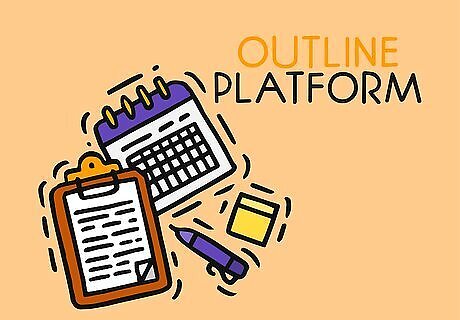
Outline your platform. To run an effective campaign, you will need to develop your political platform. Your platform should detail where you stand on key issues in your community and how you are going to fulfill the expectations of your elected role. You may also include a campaign plan along with your platform. The campaign plan may be used internally by your team to ensure the campaign is well planned and laid out ahead of time. The campaign plan may detail the estimated budget of the campaign, your marketing strategy, and your fundraising strategy.

Create a marketing strategy. Effective communication is a major part of a successful campaign. You should sit down with the marketing person on your team and come up with a detailed marketing strategy. This will allow you to stay connected to your voters and help to promote your platform. Your marketing strategy may involve creating a campaign website, where you have a professional photograph of you, your campaign slogan, and information about your platform. You may also do daily social media updates to connect with potential voters. You may also create printed materials, like brochures or fliers, to put up around the community to promote your campaign.

Solicit funding for your campaign. No matter how small your campaign may be, you will still need funding to run your campaign. These funds will help to pay for your marketing material, your campaign supplies, and any travel you need to do for the campaign. You should use the lists, labels, and letters approach. Start by creating a list of people for you or the fundraiser volunteers to call. Then, label and send out letters to get solicitations for funds into the hands of potential supporters in your community. You should also be willing to knock on doors in the neighborhood and ask for the support of your voters on election day. Hand out brochures and fliers at public, local events to solicit more fundraising for your campaign.
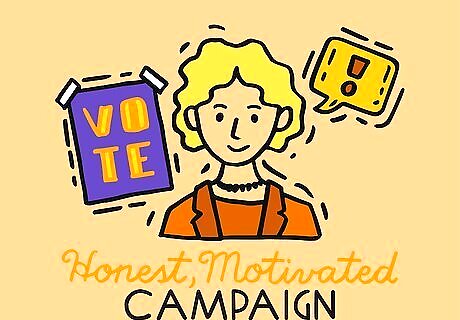
Run an honest, motivated campaign. Remember that most political campaigns, even at the local level, can be challenging and require lots of hard work. You may end up working overtime to try to win the election and your volunteers may be working with you to get your platform out to as many voters as possible. Though you may be motivated to win, you should also try to run an honest campaign. Make campaign promises that you can keep and strive to work with your community to respond to their needs, rather than serve your own needs or wants. Running an honest, motivated campaign will likely increase your chances of success and your chances of remaining in office once you are elected.




















Comments
0 comment